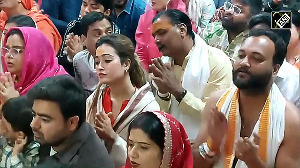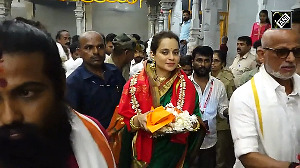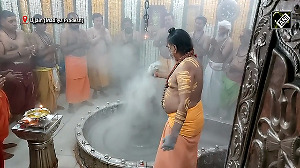Nearly 400 small bomb blasts rattled the capital and towns across Bangladesh on Wednesday as a series of carefully timed attacks killed at least two and injured 138 people and sowed panic across the country, police said.
Police said the bombs, which went off almost simultaneously, were homemade and apparently designed to cause only limited damage.
But the blasts caused panic and massive traffic jams in a number of cities, as people fled for safety and rushed to schools to bring their children home.
There was no immediate claim of responsibility but leaflets from a banned Islamic group, the Jumatul Mujahedin, were found at the scene of a number of explosions, police said.
The group wants to establish an Islamic state in Bangladesh, which is predominantly Muslim but secular.
"It's an organized attack," Lufuzzaman Babar, a top official in the Home Ministry, told the local TV station ATN Bangla.
"It's not a simple incident."
The leaflets found near a number of blast sites called for the imposition of Islamic law.
"There should not be any other laws except Allah's in a Muslim country. But it's a pity that in Bangladesh, where about 90 percent are Muslims, Allah's rules are not implemented," said the leaflets, which were written in Bengali and Arabic.
Earlier this year, the government outlawed Jumatul Mujahedin and another Islamic group, Jagrata Muslim Janata, for their alleged involvement in a spate killings, robberies and bomb attacks in Bangladesh in recent years.
The groups have denied involvement in the violence, but have vowed to work to establish Islamic rule in this nation of 140 million people.
In Dhaka, police were deployed to major intersections after the explosions, and were checking vehicles and pedestrians for bombs.
Police who examined a number of unexploded bombs said they contained explosives packed in small containers and wrapped in tape, paper or sawdust-- instead of the nails or shrapnel that more deadly bombs contain. They were rigged with small battery-powered timers, police said.
"They were meant to create sound and panic rather than serious injury," a police official told ATN Bangla. The police officer was not identified in the report.
The blasts took place mainly at government offices, press clubs and courts across the country, police and Bangladeshi media reported.
In Dhaka, about a dozen bombs exploded near the airport, at court buildings and in markets, said a city official, Kalpana Rani Dutta.
At least 10 people were injured in nine explosions in Mymensingh, a district in northern Bangladesh, said police official Shahidul Huq Bhuiyna.
At least a dozen bombs went off in Chittagong, Bangladesh's second-largest city, injuring at least two people, said police official Mahmudur Rahman.
Another 10 bombs were detonated in the northern town of Sylhet, but there were no immediate reports of casualties, said the area's chief government administrator, S M Faisal Alam. Leaflets from Jumatul Mujahedin were found at the blast sites, he said.
In the southern district of Khagrachhari, at least seven people were injured in four blasts, said a police official, Mohammed Faruq.
Leaflets from Jumatul Mujahedin were also found at the blast sites, he said.
In the southern town of Barisal, at least three people were injured when 18 bombs went off in places including the district administrator's office, police station and bus terminal.
At least three people were injured in bombings in Khulna, the country's third largest city, said the area's chief government administrator, Akbar Ali Khan.
In the southern city of Cox's Bazar, at least 10 people were injured in seven blasts, said police official Rezaul Karim.
At least seven bombs exploded, injuring four people, in eastern Brahmanbaria, said police official A.T.M. Tareq.
Nine bombs exploded injuring three people in the central town of Comilla, said police official Aurang Mahbub.






 © 2025
© 2025